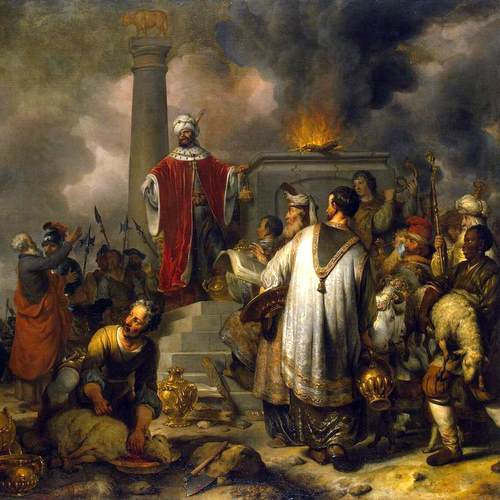Names of the Book
| English: | 1 Kings |
| Hebrew: | מלכים א |
| Transliterated: | Melakhim Alef |
| Other names: | Book of the Kings of Israel (2 Chronicles 20:34) [1 and 2 Kings were originally one book] |
 Who
Who
| Wrote the book: | unknown (possibly Jeremiah?) |
| Are the key people: | David, Solomon, Rehoboam, Jeroboam, Elijah, Ahab, Jezebel |
| Is it written to: | The people of Israel |
 What
What
| The united kingdom and the rule of Solomon (1 Kings 1:1-11:43) |
| The divided kingdom and the rule of Solomon's sons (1 Kings 12:1-22:53) |
 When
When
| Was it written: | c 550 BCE |
| Did the events occur: | c 960-560 BCE |
| Was it canonized: | c 499-100 BCE |
| (see the Timeline of the Tanakh) | |
 Where
Where
| Was it written: | unknown |
| Did the events occur: | The land of Israel: Shechem, Israel, Judah, Jerusalem, Dan, Bethel, Tirzah, Samaria, Mt. Carmel, Jezreel, Ramoth Gilead |
 Why
Why
| 1 Kings was written to inform us that: |
| Solomon's wisdom came from G-d. |
| Solomon's temple honored G-d. |
| The proper worship of G-d is important. |
| Apostasy to false gods brings division and ruin. |
| G-d requires repentance from sin. |
 Introduction
Introduction
First Kings is a historical narrative that begins with the death of King David and the reign of his son, Solomon. G-d grants Solomon great wisdom and wealth and he constructs a temple for G-d in Jerusalem. Solomon's unfaithfulness to G-d later in life, however, sets the stage for general apostasy among the people of Israel. After Solomon's death, his son Rehoboam reigns and enacts harsh policies leading to the revolt of the northern tribes that divides the nation. The northern tribes become known as Israel while the southern tribes are called Judah. G-d shows His faithfulness to His people by sending prophets, most notably Elijah, to warn them not to serve other gods. First Kings concludes by mentioning the subsequent kings of Judah and Israel and noting behavior towards to G-d.
Scripture- Book Selection
